Ivan Sergeevich Turgenev: life and work
Ivan Turgenev (1818-1883) is a world famous Russian prose writer, poet, playwright, critic, memoirist and translator of the 19th century, recognized as a classic of world literature. He wrote many outstanding works that have become literary classics, the reading of which is mandatory for school and university curricula.
Born Ivan Sergeevich Turgenev from the city of Orel, where he was born on November 9, 1818 in a noble family in the family estate of his mother. Sergei Nikolaevich, father - a retired hussar, who served before the birth of his son in a cuirassier regiment, Varvara Petrovna, mother - a representative of an old noble family. In addition to Ivan, the family had another eldest son Nikolai, the childhood of the little Turgenevs passed under the vigilant supervision of numerous servants and under the influence of their mother's rather heavy and unbending temper. Although mother was notable for her special dominance and severity of temper, she was known as a rather educated and enlightened woman, it was she who interested her children in science and fiction.
At first, the boys were educated at home, after the family moved to the capital, they continued their studies with local teachers. Then follows a new turn in the fate of the Turgenev family - a trip and subsequent life abroad, where Ivan Turgenev lives and is brought up in several prestigious boarding houses. Upon arrival at home (1833), at the age of fifteen, he entered the Faculty of Literature of Moscow State University. After the eldest son Nikolai becomes a guards cavalryman, the family moves to St. Petersburg and the younger Ivan becomes a student of the philosophical faculty of a local university. In 1834, the first poetic lines appeared from the pen of Turgenev, imbued with the spirit of romanticism (a fashionable trend at that time). Poetic lyrics were appreciated by his teacher and mentor Pyotr Pletnev (a close friend of A. S. Pushkin).
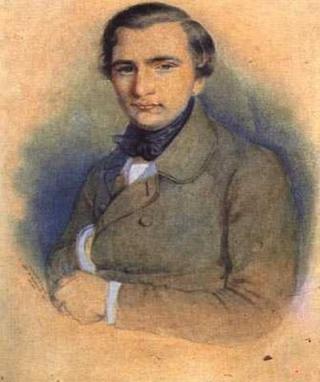
After graduating from St. Petersburg University in 1837, Turgenev left to continue his studies abroad, where he attended lectures and seminars at the University of Berlin, traveling in parallel across Europe. Returning to Moscow and successfully passing the master's exams, Turgenev hopes to become a professor at Moscow University, but due to the abolition of philosophy departments in all Russian universities, this desire will not come true. At that time, Turgenev was becoming more and more interested in literature, several of his poems were published in the newspaper Otechestvennye Zapiski, in the spring of 1843, the time of the appearance of his first small book, where the poem Parasha was published.
In 1843, at the insistence of his mother, he becomes an official in the "special office" at the Ministry of the Interior and serves there for two years, then retires. The imperious and ambitious mother, dissatisfied with the fact that her son did not live up to her hopes both in career and personal terms (did not find a worthy party for himself, and even had an illegitimate daughter Pelageya from a seamstress), refuses to support him and Turgenev has to live from hand to mouth and get into debt.
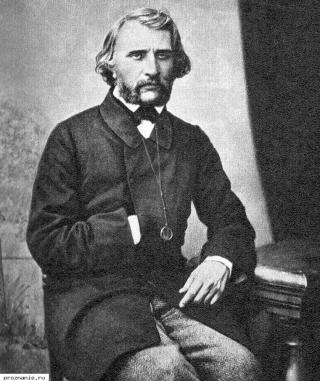
Acquaintance with the famous critic Belinsky turned Turgenev's work towards realism, and he began to write poetic and ironic moral poems, critical articles and stories.
In 1847, Turgenev brought the story “Khor and Kalinich” to the Sovremennik magazine, which Nekrasov prints with the subtitle “From the Notes of a Hunter,” this is how Turgenev’s real literary activity begins. In 1847, because of his love for the singer Pauline Viardot (he met her in 1843 in St. Petersburg, where she came on tour), he left Russia for a long time and lived first in Germany, then in France. During his life abroad, several dramatic plays were written: "Freeloader", "Bachelor", "A Month in the Country", "Provincial Girl".
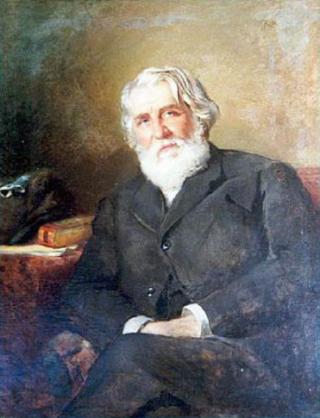
In 1850, the writer returned to Moscow, worked as a critic in the Sovremennik magazine, and in 1852 published a book of his essays called Notes of a Hunter. At the same time, impressed by the death of Nikolai Vasilievich Gogol, he wrote and published an obituary, officially banned by the tsarist caesura. This is followed by an arrest for one month, deportation to the family estate without the right to leave the Oryol province, a ban on traveling abroad (until 1856). During the exile, the story "Mumu", "Inn", "The Diary of a Superfluous Man", "Yakov Pasynkov", "Correspondence", the novel "Rudin" (1855) were written.
After the end of the ban on traveling abroad, Turgenev leaves the country and lives in Europe for two years. In 1858, he returned to his homeland and published his story "Asya", around which critics immediately flared up heated debates and disputes. Then the novel "The Nest of Nobles" (1859), 1860 - "On the Eve" is born. After that, there is a break between Turgenev and such radical writers as Nekrasov and Dobrolyubov, a quarrel with Leo Tolstoy and even the challenge of the latter to a duel, which eventually ended in peace. February 1862 - printing of the novel "Fathers and Sons", in which the author showed the tragedy of the growing conflict of generations in the context of a growing social crisis.
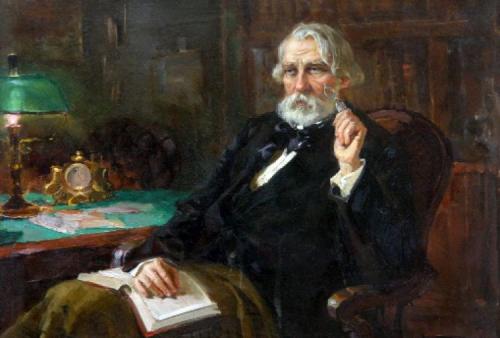
From 1863 to 1883, Turgenev lives first with the Viardot family in Baden-Baden, then in Paris, never ceasing to be interested in the events taking place in Russia and acting as a kind of mediator between Western European and Russian writers. During his life abroad, the "Notes of a Hunter" were supplemented, the novels "The Hours", "Punin and Baburin", the largest in volume of all his novels "Nov", were written.
Together with Victor Hugo Turgenev was elected co-chairman of the First International Congress of Writers, held in Paris in 1878, in 1879 the writer was elected an honorary doctor of the oldest university in England - Oxford. In his declining years, Turgenevsky did not cease to engage in literary activity, and a few months before his death, "Poems in Prose" were published, prose fragments and miniatures distinguished by a high degree of lyricism.
Turgenev dies in August 1883 from a serious illness in the French Bougival (a suburb of Paris). In accordance with the last will of the deceased, recorded in his will, his body was transported to Russia and buried at the Volkovo cemetery in St. Petersburg.
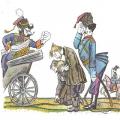 “Lefty” - a summary of the work N
“Lefty” - a summary of the work N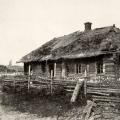 Turgenev, "Biryuk": a summary
Turgenev, "Biryuk": a summary Comedy A.N. Ostrovsky "Poverty is not a vice": a summary of the work
Comedy A.N. Ostrovsky "Poverty is not a vice": a summary of the work